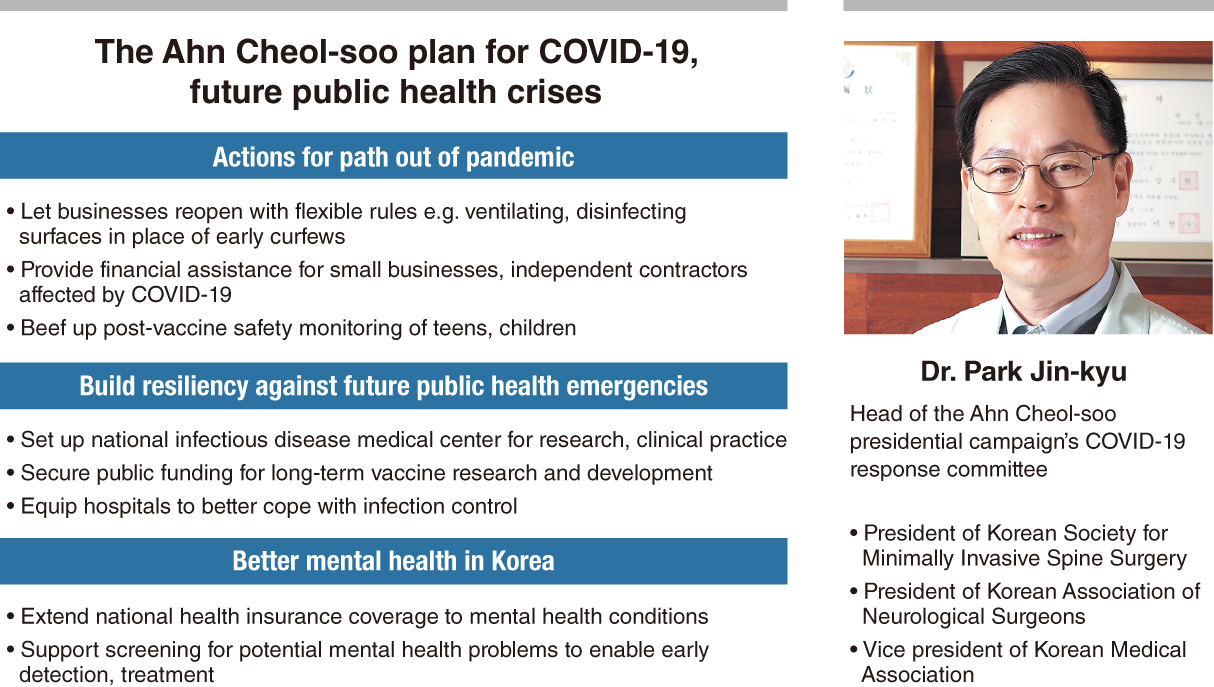Ahn Cheol-soo is only presidential contender with science literacy: adviser
By Kim ArinPublished : Feb. 11, 2022 - 20:12

Ahn Cheol-soo, the presidential candidate for South Korea’s centrist People Party, will prioritize sound judgments based on science over populism as Korea seeks a safe exit from the pandemic, according to his COVID-19 adviser.
Dr. Park Jin-kyu, COVID-19 adviser to Ahn and the former Korea Medical Association vice president, told The Korea Herald that response has been swayed by political meddling.
Ahn -- the qualified medical doctor, software engineer and two-time presidential candidate -- is the “only one that has the guts to stick to what is most sound based on the emerging science, and not jeopardize people’s health and safety by letting popular opinions dictate the course of public health decisions,” he said.
Asked to describe his COVID-19 discussions with Ahn, Park, who has been leading People Party presidential election campaign’s COVID-19 response committee since December, said, “He gets it.”
“And it’s not just because he’s a doctor himself. He knows whom to go to for best advice, and always lets the experts in the room speak,” he said.
Too often, Koreans have witnessed COVID-19 communications “becoming muddled amid politicians pushing their own agenda and health authorities urging more prudence.”
Although it’s true Korea was more successful than most countries in handling the pandemic, especially in the early days, Park said, “Think about all the lives that could have been saved, all the digressions that could have been avoided, if our leaders listened.”
An ideal leader in such tumultuous times is one who knows how to concede their place in an area where they’re not an expert in, he said.
Ahn has proven himself to be capable of just that, according to Park.
He said that Ahn has been the “voice of reason” over the last two years while the two major parties -- the ruling Democratic Party of Korea and the main conservative People Power Party -- were bent on turning the crisis into a political contest.
Ahn’s criticisms on government pandemic response “have not come without a solution,” he said.
As early as May 2020, in the aftermath of the first wave that struck Daegu, Ahn had warned of a worldwide competition to get vaccines. Then the government and the ruling party were still busy celebrating their initial success.
“Ahn has said consistently early on, that we need to start contacting companies, reach out for advance purchase deals now, when no one else in our leadership was paying any attention,” he said. “Korea was behind a lot of countries with similar economies in vaccinating its people because of this oversight.”
He said the key to Ahn’s plans for COVID-19 is about building resiliency to future public health threats.
“Resiliency sounds quite grand, but it comes from steps as simple as having fewer beds per room at hospitals,” he said. Single-bed rooms, even two-bed rooms are rare at Korean hospitals, which makes infection control more difficult.
As a long-term goal, Ahn has pledged to build a stable reservoir of public funding for research and development of vaccines and treatments, the kind of public funding that is not bound by short-term outcomes, he said.
He said Ahn also viewed compensation for vaccine-related injuries, especially life-threatening ones, to be “essential to people’s confidence in government vaccine campaigns.”
“A pandemic makes getting vaccinated kind of compulsory, and for healthy teens and children, getting the shot is more in the benefit for the community than themselves. So they should be compensated for bad outcomes following vaccination.”
As appealing as the promise is to lift social distancing restrictions, Park said that was one area that’s hard to predict at the moment.
“There may well be another troubling variant of concern that forces us to be careful again,” he said. “We have to be forthcoming about that possibility.”
But any round of restrictions must be accompanied by financial support for small businesses that will be suffering from curfews and the limit on how many people can gather.
Another campaign promise that Ahn is focusing on is mental health support for struggling Koreans.
“As serious as the pandemic is, suicide has claimed more lives than COVID-19 did,” he said. “Attempted suicide rates have risen amid the pandemic, especially among young women in their 20s.”
Ahn, together with his wife and daughter, spent the Seollal holiday volunteering at a Seoul COVID-19 testing center. Park said Ahn was there to “see what was going on on the front lines with his own eyes.”
“COVID-19 is probably not going to be the last pandemic of our lifetime. Trends in the last decade tell us infectious disease outbreaks are striking us with an interval of five to six years -- swine flu in 2009, MERS in 2015 and then COVID-19,” he said.
“To prepare for the next public health emergency we need to institute changes and build systems that last. It’s time Korea gets a president with science literacy.”












![[Today’s K-pop] BTS pop-up event to come to Seoul](http://res.heraldm.com/phpwas/restmb_idxmake.php?idx=644&simg=/content/image/2024/04/17/20240417050734_0.jpg&u=)





![[KH Explains] Hyundai's full hybrid edge to pay off amid slow transition to pure EVs](http://res.heraldm.com/phpwas/restmb_idxmake.php?idx=652&simg=/content/image/2024/04/18/20240418050645_0.jpg&u=20240419100350)

![[Today’s K-pop] Zico drops snippet of collaboration with Jennie](http://res.heraldm.com/phpwas/restmb_idxmake.php?idx=642&simg=/content/image/2024/04/18/20240418050702_0.jpg&u=)